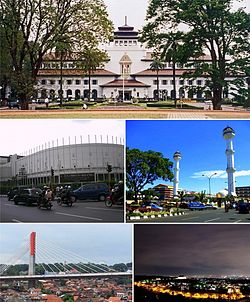Bandung
Bandung is the capital city of West Java, Indonesia and one of the largest city in Indonesia. In 2015, Bandung is also the fourth most populous city in Indonesia after Jakarta, Surabaya, and Bekasi with 2,5 million inhabitants.[3] Bandung is known for some historical events, such as the Bandung Conference (Asia-Africa Conference), a big meeting by a lot of country that voiced anti-colonialism spirit.[4] Bandung is known by its nickname "Kota Kembang" (City of Flowers), because there's so many beautiful trees and flowers that grow there. Bandung is also known as Parijs van Java (Dutch: ["The Paris of Java"] Error: {{Lang}}: text has italic markup (help)) because of its scenery.
| City of Bandung Kota Bandung | |
| Other transcription(s) | |
| • Sundanese | Template:Sund |
 | |
Flag of Flag | |
|
| |
|
| |
| Location within West Java Location within West Java | |
| Coordinates: 6°54′43″S 107°36′35″E / 6.9120°S 107.6097°ECoordinates: 6°54′43″S 107°36′35″E / 6.9120°S 107.6097°E | |
| Country | 23px Indonesia |
| Province | 22x20px West Java |
| Founded | 25 September 1810[1] |
| Incorporated (as gemeente) | 1 April 1906[1] |
| Administrative division | 30 districts 153 urban villages |
| Government | |
| • Body | Bandung City Government |
| • Mayor | Oded Muhammad Danial |
| Area | |
| • Total | 167.67 km2 (64.74 sq mi) |
| • Metro | 1,876.8 km2 (724.6 sq mi) |
| Elevation | 768 m (2,520 ft) |
| Population (2015) | |
| • Rank | 3rd |
| • Urban | 2,575,478 |
| • Metro | 8,201,928 (3rd) |
| Demographics | |
| • Ethnic groups | Sundanese Javanese Chinese Arab Indian |
| • Religion[2] | Islam 91.70% Protestantism 5.36% Catholicism 1.95% Buddhism 0.49% Hinduism 0.09% Confucianism 0.03% Others 0.02% |
| Time zone | UTC+7 (Indonesia Western Time) |
| Postcodes | 401xx, 402xx, 406xx |
| Registration plate | D |
| HDI | |
| Largest district by area | Gedebage – 9.58 square kilometres (3.70 sq mi) |
| Largest district by population | Babakan Ciparay (147,388 – 2015 est) |
| Website | Official Portal |
Bandung Media
The Savoy Homann Bidakara Hotel architectural design by Albert Aalbers in 1939 is one of the most significant examples of the Art Deco style for which Bandung is renowned.
Villa Isola, is an art-deco building in the northern part of Bandung, now it serves as the rectorate building of Indonesia University of Education.
Trans Studio Mall Bandung, is the second largest shopping mall in Bandung after Paris Van Java Mall.
The Asian-African Street Tunnel is an iconic place in Bandung with quotes about the city's beauty.
Opening National Paralympic Week 2016 (XV) in Siliwangi Stadium
Pasupati Bridge is the most famous bridge in Bandung and second-longest bridge in Indonesia.
Metro Jabar Trans corridor 2D bus stopping at IKEA Kota Baru Parahyangan
Trans Metro Bandung Corridor 5 Buses stopped at Gedebage Bus Garage
References
- ↑ 1.0 1.1 "Asal Muasal dan Sejarah Bandung". Archived from the original on 2020-04-08. Retrieved 2020-03-25.
- ↑ Data Sensus Penduduk 2010 - Badan Pusat Statistik Republik Indonesia <http://sp2010.bps.go.id/index.php/site/tabel?tid=321&wid=3200000000&lang=id>
- ↑ "Indonesia: Provinces, Regencies, Cities, Districts, Communes, Settlements - Population Statistics in Maps and Charts". www.citypopulation.de. Retrieved 2020-03-25.
- ↑ Bandung revisited : the legacy of the 1955 Asian-African Conference for international order. Tan, See Seng, 1965-, Acharya, Amitav. Singapore: NUS Press. 2008. ISBN 978-9971-69-393-0. OCLC 191658776.
{{cite book}}: CS1 maint: others (link)





